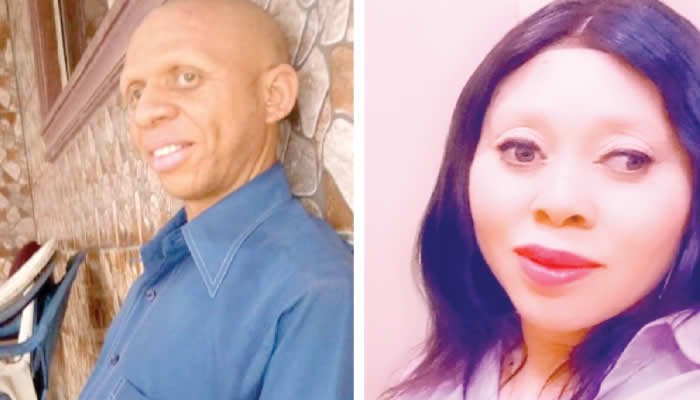
Persons living with albinism in Nigeria have always had to contend with some health-related challenges due to the genetic condition they have. But, their toughest challenge is often not the health issues they have to deal with but the different forms of social discrimination and stigmatisation from a section of the population.
Donald Tampi and Lawrence Mary, two persons living with albinism, in this report, share their experiences of battling against discrimination, stereotypes and psychological issues. OLUWATOBILOBA JAIYEOLA reports:
Donald Tampi, 32, didn’t always carry the consciousness of his albinism around. His twin brother looked like just him, with skin that didn’t like the sun and eyes that saw men as trees from distances.
He was a regular kid who played, ran, and laughed like others until he clocked 10 years of age.
From that age, he started experiencing the unusual stares from his primary school classmates, the jokes that ended with how his skin looked, and the subtle name callings.
He then realised that the body he inhabited had become target practice for mockery.
For him, primary school was a shower of ridicule, while secondary school was the downpour.
He said, “In secondary school, I was discriminated against by my peers. It was not funny at all”
He said that his classmates would sometimes pretend to be blind when they walked past him and taunt him with piercing laughter from a distance.
He recalled that he sunk into himself, noting that his face was a blank piece of paper every school day.
“They made fun of me because of my vision/eyes. I always had to move closer to the board, people laughed at me and talked bad about me, and they never said anything good about me.
“This discrimination made me feel very bad. They usually don’t mock me to my face but at my back. They used to say I could not see,” Tampi said.
According to experts, albinism is a genetic disorder that causes a decrease in the production of a pigment called melanin in the skin, hair, and eyes, resulting in light colour or no colour.
Possible eye conditions linked to albinism include poor eyesight – either short-sightedness or long-sightedness, and low vision, experts say.
Sharing the story of his school days with PUNCH HealthWise, Tampi noted that the immense loneliness he experienced affected his performance in school.
He stated that with the Nigerian schooling system not designed for people with differences, persons with albinism are often at a disadvantage in schools.
He said, “I felt very terrible. I was being neglected and discriminated against by my peers and I felt different as I didn’t look like others which made going to school tough.
“I always move to the front and sit on the floor to write but when the time is up, I have to stop even when I have not finished.
“Most of the time when I try to borrow notes in primary school, no one would be willing to give them, so it affected my academic performance, I performed low.
“However, in secondary school, I somehow managed myself and tried my best to perform well. I realised I had to get on with my life even when the system is against me.
“This, however, affected me psychologically because I always felt very lonely.
“At the time, I felt we were all humans created by God and didn’t deserve to be discriminated against. So, I used to wonder why people are doing it.
“But, now that I am grown, I don’t feel that way anymore. Also, I have learnt a lot from the Albino foundation, especially how to deal with those social discriminations.
“The Foundation has helped me and changed my perspective towards life.”
According to a recent report released by the Albino Foundation of Nigeria, the majority of persons with albinism in the country suffer a high level of discrimination.
The report noted that while relatively few cases of attacks against persons with albinism have been reported, a study in 2014 disclosed that 41 per cent of persons with albinism had mental health issues.
Also sharing her experience with our correspondent, Lawrence Mary, now 30, recalled that she became aware of her albinism while she was in primary school due to her experience in class and how she was treated.
She said, “It was when I was in primary school that I got to understand that I was different from other people.
“I noticed in class that I couldn’t see from far whenever I sat at the back. Then, I was so little and shy to even voice out my problems. It was affecting my performance in school, yet I had no one to talk to.
“I couldn’t tell anyone how I was feeling so the teachers at a point had to call my elder sister to come to the office and informed her that they want to see my parents, but I noticed that my dad knew everything about it, so he was the one that came down to the school and told them to be writing boldly on the board. I then changed my sitting position to the front.”
She said things became easier for her in class afterward, adding that her academics improved.
She said, “I remember that every term. I came first in class because everything was easier for me. After all, I could see clearly.
“When I was not seeing clearly instead of me to even voice out, I would not voice out, I would just sit where I am and I will just be writing nonsense.”
According to the Albino Foundation of Nigeria, only about 12 attacks against people with albinism have been reported in the nation. Yet, bullying and name-calling are common for children with albinism.
Mary said, “I mostly felt stigma in secondary school. This was regarding the issue of my eyes and not being able to see clearly. They normally call me oyinbo pepper.





